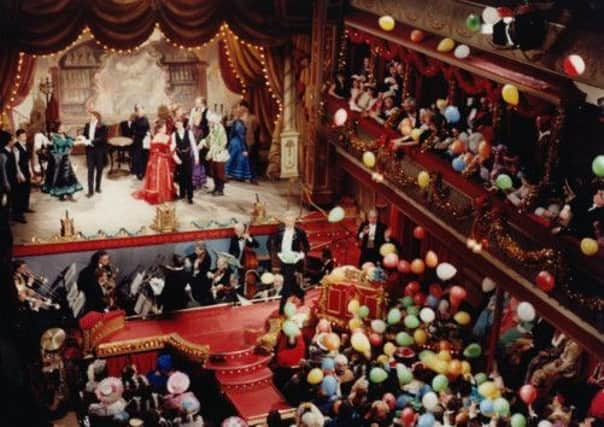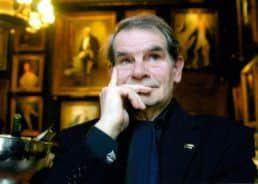Good old days just keep going for the music hall show that refuses to die


IF you happened to be in Leeds last weekend you may have spotted the occasional raffish-looking dandy sporting a flash waistcoat, or a lady in Edwardian dress wearing an elaborate hat.
If you did, then the chances are you saw someone on their way to The Good Old Days at the City Varieties. The popular variety show is back at its spiritual home this month bringing with it the customary singalongs, comedy routines and colourful period costumes.
Advertisement
Hide AdAdvertisement
Hide AdIt’s 60 years since The Good Old Days was first shown on the BBC and although it was only going to be a one-off homage to the old music hall era it ran for the next 30 years. During its heyday the show had a TV audience of about 10 million (the kind of figure that most of today’s TV chiefs can only dream about) and was a magnet for big names such as Danny La Rue, Ken Dodd, Barbara Windsor, Les Dawson and Roy Hudd, among a host of others.


Back in 1953, although music hall was dead, its offspring, Variety, was very much alive. A BBC producer by the name of Barney Colehan believed there was an appetite for this kind of nostalgic entertainment and so The Good Old Days was born with Colehan the creative force behind it.
Rachel Lythe, head of learning at the City Varieties, says The Good Old Days holds a special place in many people’s affections. “Generations of viewers remember sitting and watching the show on TV with their grandparents and parents.”
By 1983, though, its TV days had come and gone and the BBC decided to bring down the curtain. Danny La Rue closed the final TV show on Christmas Eve 1983 with We’ll Meet Again – not a music hall number but a song that fitted the mood.
Advertisement
Hide AdAdvertisement
Hide AdIt’s perhaps hard to believe that at one time there was a waiting list of more than 20,000 people wanting to get on the show, 10,000 of whom were left disappointed when the BBC called time. That could easily have been the end of the story but after a five-year gap, The Good Old Days was revived, this time without the TV and it has been a firm fixture on the City Varieties programme ever since.
Halifax-born comedian Johnnie Casson, who first performed in The Good Old Days 15 years ago, headlined last week’s show. “It’s a style of entertainment that people don’t really get to see nowadays but, for me, it’s a part of showbusiness that’s still relevant,” he says. “It doesn’t have the TV cameras any more but it still sells out every time it’s on, so it must have something going for it.”
He says as performer it’s a joy to be part of. “You can sense the ghosts of those who’ve been there before you, people like Stan Laurel and Charlie Chaplin. For me, it’s an honour just to be able to stand in the wings never mind going on stage.”
To younger generations brought up on a diet of glossy TV music and comedy shows The Good Old Days might seem a little dated. But Lythe disagrees. “If you look at shows like X Factor and Britain’s Got Talent they’re very successful and they follow a very traditional format that isn’t that much different to The Good Old Days.
Advertisement
Hide AdAdvertisement
Hide AdCasson, too, believes it still has a broad appeal. “You’ve got jugglers, singers, comics and tap dancers. It’s not pretentious and it’s not trying to educate people, it’s good, honest all-round entertainment,” he says.
Veteran comedian Barry Cryer has fond memories of the show. “My first appearance on The Good Old Days was in the 1960s, when Barney asked me to sing a song. I chose My Girl’s a Yorkshire Girl. It was a bit of a an ‘eeh, bah gum’ sort of song, and Barney said afterwards ‘You can come back, but don’t do that again.’ He suggested I did a Scotsman impersonation instead.”
As a past performer, Cryer has a mine of anecdotes about the show. “One week Barney got the wonderful Eartha Kitt to top the bill. She took it very seriously and got a friend to record a few old music hall songs for her to practise beforehand.
“Prior to the renovation, the backstage area of the City Varieties was shockingly shabby, and when she arrived for rehearsal and was shown to her dressing room, Miss Kitt was horrified at what she saw. But then Barney told her that it had been Charlie Chaplin’s dressing room and it changed everything. After that she boasted to everyone that she had Charlie Chaplin’s dressing room.”
Advertisement
Hide AdAdvertisement
Hide AdHe says Colehan would tell stories about the great and good he’d come close to getting to perform in the show. “He went to London when Bing Crosby was performing at the Palladium, to ask the great man if he’d come and do The Good Old Days. He got to meet him in his dressing room and Bing said he would be delighted to come to Leeds. Barney was thrilled, but unfortunately Bing died not long afterwards on a Spanish golf course.”
Although fewer people are inclined to get dressed up now that the TV cameras have gone, The Good Old Days still attracts popular showbiz figures, with Yorkshire’s Bobby Knutt headlining this weekend’s shows and Roy Hudd top of the bill the weekend after.
Johnny Dennis has hosted the stage show since it returned 25 years ago, replacing the outgoing chairman Leonard Sachs, and believes its popularity hasn’t waned.
“We had a lot of folk from all over the country at the weekend which shows that it’s still popular and when we go to provincial theatres there’s always a good crowd because people like to be entertained.”
Advertisement
Hide AdAdvertisement
Hide AdDennis says that during its heyday the show was known all around the world. “It was dubbed into foreign languages although what a ‘magnificent mélange of musicality and mirth’ sounds like in Japanese, I don’t know,” he says, laughing. “It was hugely popular in the English-speaking world, but also in Europe, particularly in Sweden and Norway, which aren’t places you would necessarily think The Good Old Days would be popular in.”
It helped make Leonard Sachs a household name in the unlikeliest of places. “When we ran stage shows in Sweden Leonard couldn’t walk down the street without people coming over to talk to him.”
Dennis has worked with some big names himself during his time as chairman. “Some of my biggest memories come from doing The Good Old Days. I remember being on stage with Eartha Kitt sitting on my knee and whispering the song An Englishman Needs Time into my ear. I also did a duet with Frankie Vaughan when he dragged me up on stage with him. He was an icon in his day and for me to be able to sing with him was just incredible.”
He believes the show’s popularity stems from the fact it appeals to ordinary people. “It’s the people’s entertainment and the people’s songs and it’s part of a tradition that goes back to Victorian and Edwardian times when this music hall tradition took off.”
Advertisement
Hide AdAdvertisement
Hide AdIt’s a tradition The Good Old Days has continued. “The City Varieties is a beacon and everyone wants to work there because it has a soul. I’ve been in this business 50-odd years and I still run to the theatre so I can get on the stage, it’s an absolute thrill,” he says.
“This amazing story continues and with the theatre now refurbished it has a new lease of life and I’m convinced the public wants this wonderful entertainment to continue.
“People know what they’re coming to watch and they know most of the jokes they’re going to hear, but it’s like coming to see an old friend – it’s something you never grow tired of.”
The Good Old Days is at the City Varieties every Friday at 7pm and Saturday at 2pm and 7pm throughout March. For tickets visit www.cityvarieties.co.uk or call the box office on 0113 243 0808.
A palace of entertainment
Advertisement
Hide AdAdvertisement
Hide AdThe City Varieties was built in 1865 above the Swan Inn, on a side street toward the top of Briggate, in Leeds.
The Grade II listed Victorian music hall is one of only four old-style music halls left in the UK – in their heyday there were 700 such venues.
It has seen some of the world’s greatest comedians and entertainers, including Charlie Chaplin, Harry Houdini and Laurel and Hardy, perform on its hallowed stage – and even saw the legendary Buster Keaton fall off it.
The Good Old Days was first aired on the BBC in 1953 and was televised for the next 30 years.
At the height of its popularity the show pulled in a TV audience of about 10 million.